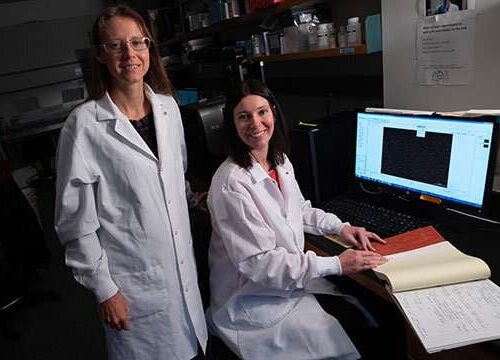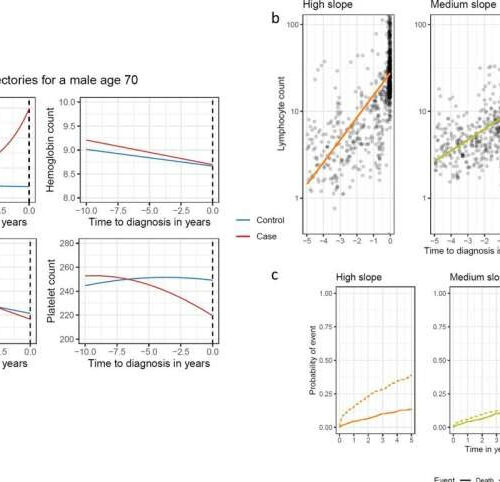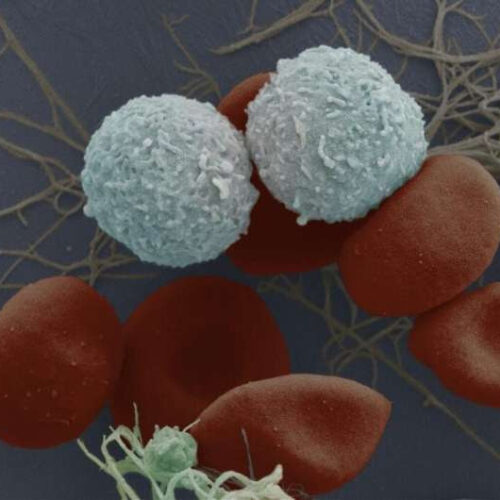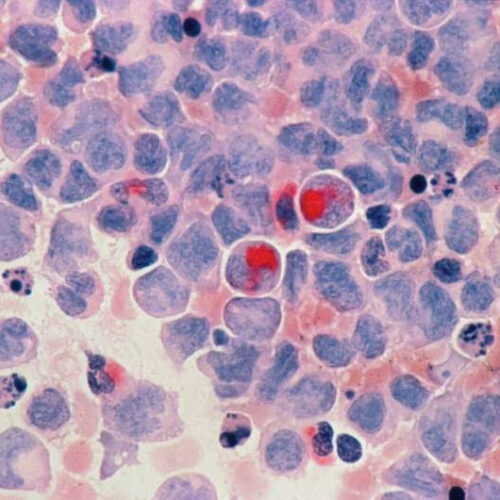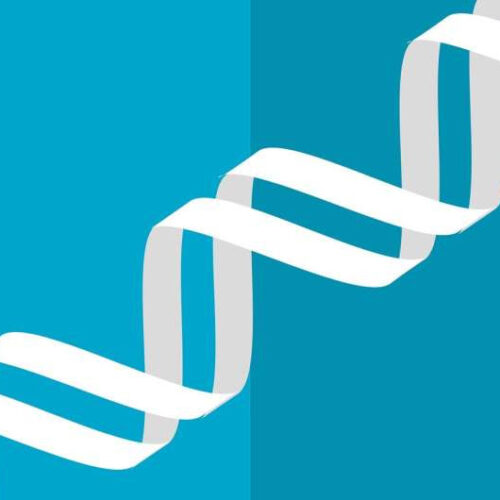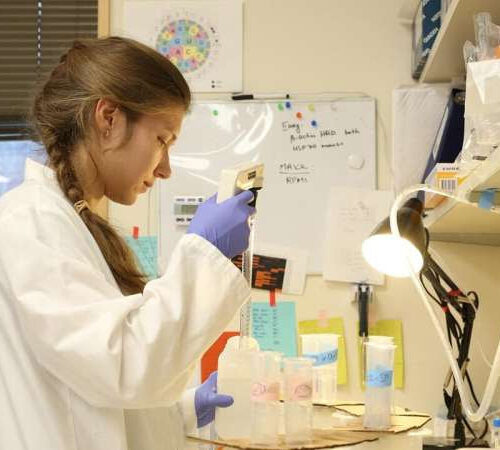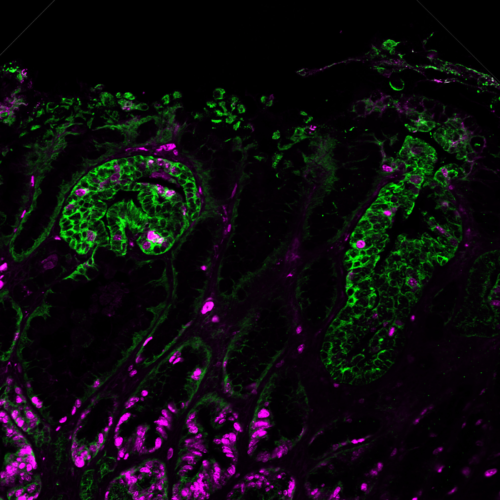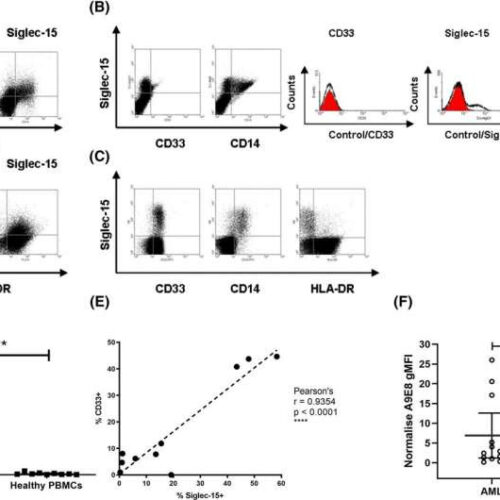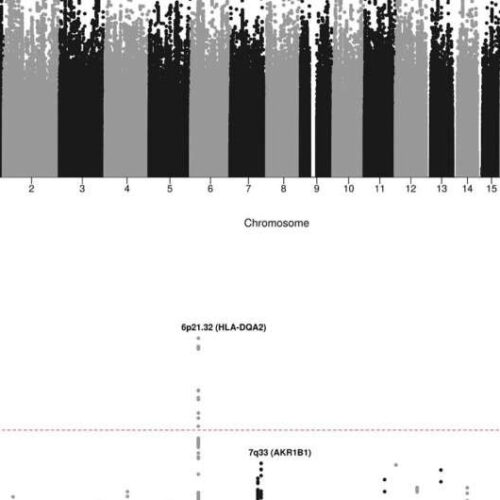by Jade Boyd, Rice University Natasha Kirienko (left) and Svetlana Panina in Kirienko’s Rice University laboratory in 2019. Kirienko, associate professor of biosciences, and Panina, a former postdoctoral research associate in Kirienko’s lab, collaborated with researchers at the University of Texas MD Anderson Cancer Center to study potential new mitophagy-inducing drugs that could be paired with...
Tag: <span>Leukemia</span>
An app to help doctors help patients with leukemia
by University of Copenhagen Model predictions for a 70-year-old person. a Predictions for a 70-year-old male based on the linear regression model for absolute lymphocyte count (ALC), hemoglobin count, CRP, and platelet count. b Observed ALC for the three slope groups. The colored line is a linear smoother. c The graphs show the cumulative incidence of time to first treatment or...
New mark for targeted leukemia treatment
by The Francis Crick Institute Red blood cells and white blood cells. Credit: Francis Crick Institute Researchers led by the Francis Crick Institute have found that blocking a particular protein could offer a new way to target leukemic stem cells without causing harm to healthy stem cells. More than 3,000 people are diagnosed with acute...
Locking leukemia’s cellular escape hatch
by Alissa Kocer, Duke University Acute myelocytic leukemia (AML). Credit: Unsplash/CC0 Public Domain Leukemia starts in cells that would normally develop into different types of blood cells. About 61,000 people in the U.S. are diagnosed each year, and depending on the type of leukemia and the age of the patient, five-year survival rates vary between...
Targeting “anti-tumor” genes to provide better treatment for leukemia
by Ecole Polytechnique Federale de Lausanne Credit: CC0 Public Domain Chronic lymphocytic leukemia (CLL) is one of the most common blood cancers in adults. The disease originates in B cells—the part of the immune system that produces antibodies—and then evolves slowly, typically affecting older people. Today, the best method of treating severe forms of CLL...
Obscure protein is spotlighted in fight against leukemia
JANUARY 11, 2022 by Cold Spring Harbor Laboratory Former Cold Spring Harbor Laboratory (CSHL) graduate student Sofya Polyanskaya in the lab of CSHL Professor Christopher Vakoc. Credit: CSHL/2018 Acute myeloid leukemia (AML) is an aggressive cancer of white blood cells with few effective targeted therapies available to treat it. Cold Spring Harbor Laboratory (CSHL) Professor Christopher...
New immunotherapy for leukemia discovered
by Karolinska Institutet Credit: Unsplash/CC0 Public Domain Researchers at Karolinska Institutet, University of Oslo, and Oslo University Hospital have developed a new kind of immunotherapy for leukemia. The results of a study published in Nature Biotechnology show that the therapy kills cancer cells from patients with acute lymphoblastic leukemia. The researchers now want to conduct...
‘Magic bullet’ found in fight against leukemia
by University of Aberdeen High sialic acid-binding immunoglobulin-like lectin (Siglec)-15 surface expression on circulating blood cells from patients with acute myeloid leukaemia (AML). Cell surface expression of Siglec-15 on peripheral blood leucocyte preparations from the peripheral blood of patients with AML. Nine out of 12 patients with AML showed significant cell surface expression of Siglec-15...
Study identifies genetic risk factors for leukemia
by Newcastle University Fig. 1: Manhattan plots from acute myeloid leukemia meta-analysis of 4 genome-wide association studies. For each GWAS, association tests were performed for all AML cases and cytogenetically normal AML assuming an additive genetic model, with nominally significant principal components included in the analysis as covariates. Association summary statistics were combined for variants...
Advancing treatment for B-cell acute lymphoblastic leukemia
by Melissa Rohman, Northwestern University A Wright’s stained bone marrow aspirate smear of patient with precursor B-cell acute lymphoblastic leukemia. Credit: VashiDonsk/Wikimedia/CC BY-SA 3.0 A retrospective study led by Northwestern Medicine investigators found that the chimeric antigen receptor (CAR) T-cell immunotherapy drug tisagenlecleucel demonstrated safety and efficacy in pediatric patients with relapsed and refractory B-cell acute...

